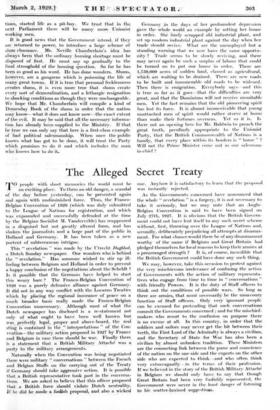The Alleged Secret Treaty
To people with short memories the world mast be an exciting place. To them an old danger, a scandal. of the day before yesterday, can be presented again and again with undiminished foree. Thus, the Franco- Belgian Convention of 1920 (which was duly subthitted to the League of Nations for registration, and which was -expounded and successfully defended at the time by the Belgian Socialist M. Vandervelde) has reappeared in a disguised but not greatly altered form, and has shaken the journalists and a large part of the public in Holland and Germany. It has been taken as a new portent of subterranean intrigue.
This " revelation " was made by the Utrecht Dagblad, a Dutch Sunday newspaper. One wonders who is behind the " revelation." Has someone wished to stir up ill- feeling between Belgium and Holland in order to prevent a happy concluSion of thenegotiations about the Scheldt ? Is it possible that the Germans have helped to start this weary hare.? . The Franco-Belgian Convention of 1920 was a purely defensive alliance against Germany. It did. not in .any way .conflict with the Locarno Treaties which by placing_ the regiOnal insurance of peace on a much broader basis really . made the Franco-Belgian. Convention unnecessary. Although most of what the Dutch newspaper has disclosed is_ a re-statement not only of what ought, to have., been . well known. but was, perfectly legal,. proper- and above-board, - the _ real stink. is contained in the ,‘" interpretations " . of the Con- vention—the military, action proposed in 1927 by France and Belgium in case there should be war. Finally there, is a statement that • a British. Military Attache was a party to the Military arrangements.
Naturally when the Convention was being negotiated. there were military "conversations 7 between the French and Belgian Staffs on the carrying.out of the Treaty if Germany should take aggressive action. It is possible that a British representative took part .in the conversa- tions. We are asked to believe that- this officer proposed that a British force should violate Dutch neutrality. If he did be. made a foolish proposal; and also a wicked . .
one. Anyhow it is satisfactory to learn that the proposal was instantly rejected.
As the Governments concerned have announced that the whole " revelation " is a forgery, it is not necessary to take it seriously, but we may note that an , Belgian Convention is said to have been signed on July 27th, 1927. It is obvious that the British Govern- ment could not have lent itself to any such secret scheme without, first, throwing over the League of Nations and, secondly, deliberately prejudicing all attempts at disarma- ment. For what chance would there be of any disarmament worthy of the name if Belgium and Great Britain had pledged themselves for local reasons to keep their armies at a prearranged strength ? It is, of course, incredible that the British Government could have done any such thing.
We may, however, take this occasion to protest againSt the very mischievous irrelevance of confusing the action of Governments with the action of military representa- tives who engage from time to time in ".conversations " with friendly Powers. It is the duty of Staff officers to think out the conditions of .poisible wars.' So long as there are armies, that must' necessarily. be the unsavoury function of Staff officerS. - Only very ignorant people can be excused for pretending that such conversations commit the Governments concerned ; and for the mischief- makers. who resort to .the confusion on .purpose 'there is no excuse at all. In this country, in order that the. soldiers and sailors may, never get the. bit betWeen their teeth, the First Lord of.the Admiralty is always a civilian, and the Secretary.. of State for War has also been a civilian by. almost unbroken tradition. These Ministers_ are the connecting link between the purse and conscience of the nation on the oneside and the experts on the other side who are .expected to think—and who often. think very extravagantly—in the terms of their profession. If we believed in the story of the British Military Attache in Belgium we should only have. to .say that though Great Britain had been very foolishly represented, the Government were never in the least danger of listening to his scatter-)grained suggestions.
























































 Previous page
Previous page